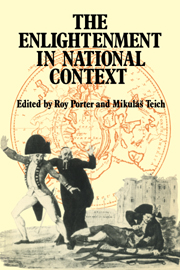Book contents
- Frontmatter
- Contents
- Preface
- 1 The Enlightenment in England
- 2 The Scottish Enlightenment
- 3 The Enlightenment in France
- 4 The Enlightenment in the Netherlands
- 5 The Enlightenment in Switzerland
- 6 The Italian Enlightenment
- 7 The Protestant Enlightenment in Germany
- 8 The Enlightenment in Catholic Germany
- 9 Reform Catholicism and Political Radicalism in the Austrian Enlightenment
- 10 Bohemia: From Darkness into Light
- 11 The Enlightenment in Sweden
- 12 The Russian Enlightenment
- 13 Enlightenment and the Politics of American Nature
- Afterword
- Notes to the text
- Further reading
- Index
4 - The Enlightenment in the Netherlands
Published online by Cambridge University Press: 24 September 2009
- Frontmatter
- Contents
- Preface
- 1 The Enlightenment in England
- 2 The Scottish Enlightenment
- 3 The Enlightenment in France
- 4 The Enlightenment in the Netherlands
- 5 The Enlightenment in Switzerland
- 6 The Italian Enlightenment
- 7 The Protestant Enlightenment in Germany
- 8 The Enlightenment in Catholic Germany
- 9 Reform Catholicism and Political Radicalism in the Austrian Enlightenment
- 10 Bohemia: From Darkness into Light
- 11 The Enlightenment in Sweden
- 12 The Russian Enlightenment
- 13 Enlightenment and the Politics of American Nature
- Afterword
- Notes to the text
- Further reading
- Index
Summary
The Enlightenment came to the Dutch Republic rather as an urbane but hard-pressed man of affairs might come visiting among hayseed provincial cousins. Gratitude for hospitality was tempered by bemused condescension and by the kind of heavy forbearance which strains politeness between host and guest. The upshot of the experience was an acknowledgement of kinship – but a sharpened awareness of its remoteness.
Moreover, the Enlightenment – that most reified bundle of axioms – appeared in the Netherlands in not one but three guises. The first was as the crusade for toleration and free enquiry seeking shelter from harassment. This flattered what had become a stock component in the Dutch view of themselves as a morally heroic asylum where neither bigotry nor censorship was entertained. This not wholly accurate stereotype found ringing endorsement from a succession of beneficiaries of Dutch liberality who echoed Bayle's view that the Republic of Letters was indeed ‘la grande arche des fugitifs’. In its second incarnation the Enlightenment appeared as professional publicist and campaigner, looking for reliable printers, publishers and distributors in tricky or illicit markets. Finally the Enlightenment entered Dutch vernacular culture itself, but in so doing transmuted its nature into a moral revival answering the calls of both economic and political crises.
That these three roles were not only not culturally continuous but were actually mutually incompatible may be illustrated by the following impressions.
- Type
- Chapter
- Information
- The Enlightenment in National Context , pp. 54 - 71Publisher: Cambridge University PressPrint publication year: 1981
- 4
- Cited by



